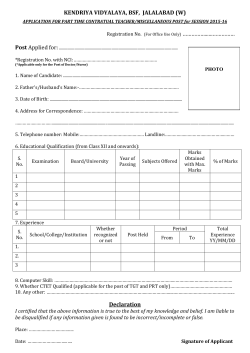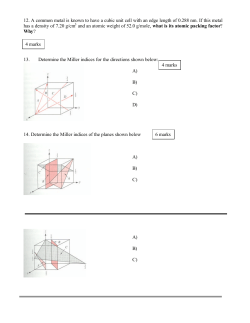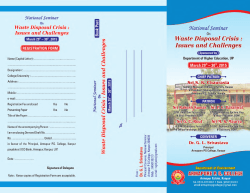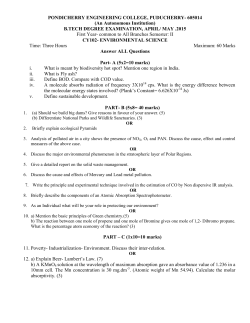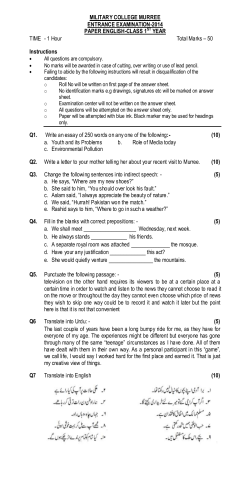
1. Consider two propositions p and q. (a) Complete
1. Consider two propositions p and q. (a) Complete the truth table below. p q T T T F F T F F ¬q p ⇒ ¬q ¬p ¬p ⇒ q (4) (b) Decide whether the compound proposition (p ⇒ ¬q) ⇔ (¬p ⇒ q) is a tautology. State the reason for your decision. (2) (Total 6 marks) 2. Consider the two propositions p and q. p: The sun is shining q: I will go swimming Write in words the compound propositions (a) p ⇒ q; (2) (b) ¬p ∨ q. (2) The truth table for these compound propositions is given below. (c) p q p⇒ q T T T T T F F F F T T T F F T T ¬p ¬p ∨ q Complete the column for ¬p. (1) IB Questionbank Mathematical Studies 3rd edition 1 (d) State the relationship between the compound propositions p ⇒ q and ¬p ∨ q. (1) (Total 6 marks) 3. Consider the following logic propositions: p: Sean is at school q: Sean is playing a game on his computer. (a) (b) (c) Write in words, p ∨ q. (2) Write in words, the converse of p ⇒ ¬q. (2) Complete the following truth table for p ⇒ ¬q. p q T T T F F T F F ¬q p ⇒ ¬q (2) (Total 6 marks) IB Questionbank Mathematical Studies 3rd edition 2 4. (a) (i) Complete the truth table below. (ii) p q T p∧q ¬(p ∧ q) ¬p ¬q T F F T F F T F T T F F F T T ¬p ∨ ¬q State whether the compound propositions ¬(p ∧ q) and ¬p ∨ ¬q are equivalent. (4) Consider the following propositions. p: Amy eats sweets q: Amy goes swimming. (b) Write, in symbolic form, the following proposition. Amy either eats sweets or goes swimming, but not both. (2) (Total 6 marks) 5. The truth table below shows the truth-values for the proposition p∨q⇒¬p∨¬q p q ¬p ¬q T T F F T F F F T T F F T p∨q ¬p∨¬q p∨q⇒¬p∨¬q F T T T F T T T T F T (a) Explain the distinction between the compound propositions, p ∨ q and ¬ p ∨ ¬ q. (b) Fill in the four missing truth-values on the table. (c) State whether the proposition p ∨ q ⇒ ¬ p ∨ ¬ q is a tautology, a contradiction or neither. (Total 6 marks) IB Questionbank Mathematical Studies 3rd edition 3 6. Consider each of the following statements: p: Alex is from Uruguay q: Alex is a scientist r: Alex plays the flute (a) Write each of the following arguments in symbols: (i) If Alex is not a scientist then he is not from Uruguay. (ii) If Alex is a scientist, then he is either from Uruguay or plays the flute. (3) (b) Write the following argument in words: ¬ r ⇒ ¬ (q ∨ p) (c) (3) Construct a truth table for the argument in part (b) using the values below for p, q, r and ¬ r. Test whether or not the argument is logically valid. p q r ¬r T T T F T T F T T F T F T F F T F T T F F T F T F F T F F F F T (4) (Total 10 marks) IB Questionbank Mathematical Studies 3rd edition 4 7. Three propositions are given as p: It is snowing (a) q: The roads are open r: We will go skiing Write the following compound statement in symbolic form. “It is snowing and the roads are not open.” (2) (b) Write the following compound statement in words. (¬p ∧ q ) ⇒ r (3) An incomplete truth table for the compound proposition (¬p ∧ q ) ⇒ r is given below. (c) Copy and complete the truth table on your answer paper. p q r T T T T T F T F T T F F F T T F T F F F T F F F ¬p ¬p ∧ q (¬p ∧ q ) ⇒ r (3) (Total 8 marks) 8. Let p and q be the statements p: you watch the music TV channel q: you like music (a) Consider the following logic statement. If you watch the music TV channel then you like music. (i) Write down in words the inverse of the statement. (ii) Write down in words the converse of the statement. (4) IB Questionbank Mathematical Studies 3rd edition 5 (b) Construct truth tables for the following statements: Use the table below. (i) p ⇒ q. (ii) ¬ p ⇒ ¬ q. (iii) p ∨ ¬ q. (iv) ¬ p ∧ q. p q T T T F F T F F (c) (4) Which of the statements in part (b) are logically equivalent? (1) (Total 9 marks) IB Questionbank Mathematical Studies 3rd edition 6
© Copyright 2026


